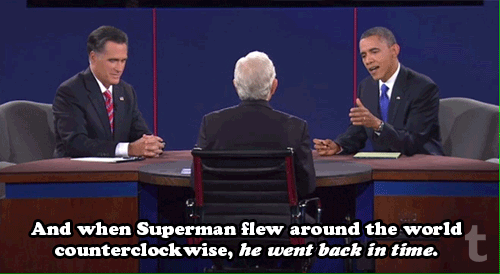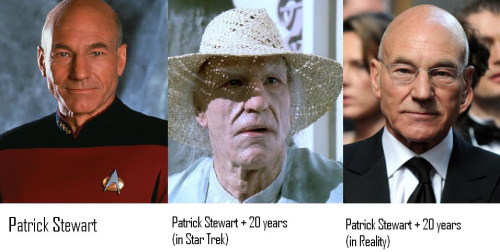Wednesday, October 31, 2012
Saturday, October 27, 2012
Tuesday, October 23, 2012
Friday, October 19, 2012
Star Trek: TNG
But I think The Next Generation's underlying appeal went beyond the image of happy, smart people saving you a seat in Ten Forward. As an example here, think about the Harry Potter series. One of the reasons J.K. Rowling's books exerted such an appeal over every sentient creature on earth is that they resolved, indeed fused, a cultural contradiction. She took the aesthetic of old-fashioned English boarding-school life and placed it at the center of a narrative about political inclusiveness. You get to keep the scarves, the medieval dining hall, the verdant lawns, the sense of privilege (you're a wizard, Harry), while not only losing the snobbery and racism but actually casting them as the villains of the series. It's the Slytherins and Death Eaters who have it in for mudbloods, not Harry and his friends, Hogwarts' true heirs. The result of this, I would argue, is an absolutely bonkers subliminal reconfiguration of basically the entire cultural heritage of England. It's as if Rowling reboots a 1,000-year-old national tradition into something that's (a) totally unearned but (b) also way better than the original. Of course it electrified people.Computer Love
Star Trek does something similar, though with an American contradiction that's arguably even more fundamental. It was already possible, by the early '90s and actually long before them, to trace the terms of the current partisan divide in America. Conservatives — think in Jonathan Haidt–ish terms here — value tradition, authority, and group identity; liberals value tolerance, fairness, and care. Or whatever; you can draw the distinctions however you'd like. The point is, The Next Generation depicts a strict military hierarchy acting with great moral clarity in the name of civilization, all anti-postmodern, "conservative" stuff — but the values they're so conservatively clear about are ideals like peace and open-mindedness and squishy concern for the perspectives of different cultures. "Liberal" ideals, in other words. You could say, roughly, that the Enterprise crew is conservative as a matter of method and liberal as a matter of goal. They sail through the universe with colonialist confidence sticking up for postcolonial ideals. I mean, Starfleet has a Prime Directive … but it's explicitly non-interventionist! This is so weird that it's almost hard to notice; your mind just sort of slides over it. But it's fascinating in numberless ways. Picard is both indisputably the most patriarchal Star Trek captain and indisputably the least likely to punch anyone in the face. No one is more individualist than the individuals of the Enterprise, but their individualism has led them to reject most forms of private property (because it actually holds them back, they're so boldly individualistic) and embrace ultra-centralized health care. The show is able to indulge a serious jones for the classical Western canon — Shakespeare, Mozart, et al. — without really running against the grain of multiculturalism at all, at least by late-'80s standards. Data will be listing some violinists whose style his programming can mimic, and some of them will be Heifetz and some of them will be aliens a guy just made up for the script. It's totally nuts, but it's also a fantasy of the American psyche that, if you can get into it, makes a lot of fine things suddenly seem possible, and makes some debilitating anxieties just sort of fall away.
Thursday, October 18, 2012
Tuesday, October 16, 2012
Friday, October 12, 2012
Wednesday, October 10, 2012
Monday, October 08, 2012
Superheroes and the system
So, laws emerge from illegal activity. This creates a fundamental incoherence in the very idea of modern government, which assumes that the state has a monopoly of the legitimate use of violence (only the police, or prison guards, have the legal right to beat you up.) It’s okay for police to use violence because they are enforcing the law; the law is legitimate because it’s rooted in the constitution; the constitution is legitimate because it comes from the people; the people created the constitution by acts of illegal violence. The obvious question, then, is: how does one tell the difference between “the people” and a mere rampaging mob? There is no obvious answer.
Insofar as there is a potential for constituent power then, it can only come from purveyors of violence. The supervillains and evil masterminds, when they are not merely indulging in random acts of terror, are always scheming of imposing a New World Order of some kind or another. Surely, if Red Skull, Kang the Conqueror, or Doctor Doom ever did succeed in taking over the planet, there would be lots of new laws created very quickly, although their creator would doubtless not himself feel bound by them. Superheroes resist this logic. They do not wish to conquer the world—if only because they are not monomaniacal or insane. As a result, they remain parasitical off the villains in the same way that police remain parasitical off criminals: without them, they’d have no reason to exist. They remain defenders of a legal and political system which itself seems to have come out of nowhere, and which, however faulty or degraded, must be defended, because the only alternative is so much worse.Super Position
Thursday, October 04, 2012
Wednesday, October 03, 2012
Environmental education
This is the joy of children encountering the natural world on their own terms, and more and more it is becoming a lost idyll, no longer an integral part of growing up. There are many reasons for this loss—urbanization, the changing social structure of families, ticks and mosquito-borne illnesses, the fear of stranger danger. And perhaps even environmental education is one of the causes of children’s alienation from nature.Look, Don't Touch
I know that’s a puzzling statement. You’re thinking: environmental education is supposed to connect children with nature, to get them started on a lifetime of loving and wanting to protect the natural world. Yes—that’s what is supposed to happen. But somewhere along the way, much of environmental education lost its magic, its “wildly, gladly rejoicing together.” Instead, it’s become didactic and staid, restrictive and rule bound. A creeping focus on cognition has replaced the goal of exhilaration that once motivated educators to take children outside.
Monday, October 01, 2012
Subscribe to:
Posts (Atom)




